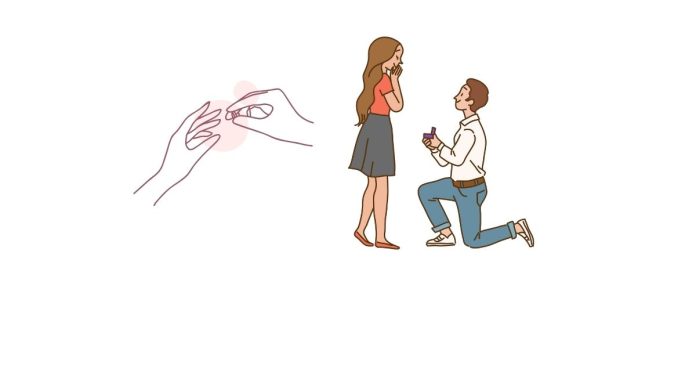Both “Will you marry me?” and “Would you marry me?” are grammatically correct, but they are used in different contexts and convey slightly different meanings based on the tone and intent behind the question. Let’s explore the differences in detail.
1. “Will you marry me?”
This phrase is a straightforward and direct way of asking someone to marry you. “Will” is the future tense of the verb “to will”, and it generally implies a question about the future, specifically about someone’s willingness or intention to do something.
When to Use “Will you marry me?”
- Certainty and Confidence: This phrase suggests that the speaker believes the person will say yes. It’s often used when the speaker feels confident about the proposal and believes that the answer will be affirmative.
- Example: “Will you marry me?” is a direct and confident way to ask, implying the speaker expects or hopes for a “yes.”
- Determined Request: The use of “will” indicates a desire for a commitment in the future, often with a sense of determination or certainty. It’s more like asking if the other person is willing to take a specific action (marriage) in the future.
Example Sentences Using “Will”:
- “Will you marry me?” (Direct question, implying the speaker believes it’s a straightforward future decision.)
- “Will you marry me and spend the rest of your life with me?” (A more romantic version, with a certain expectation of agreement.)
2. “Would you marry me?”
This phrase is slightly more formal and polite. “Would” is a conditional form of “will,” used to express something less direct, more hypothetical, or more tentative. It suggests that the speaker is asking about the possibility or likelihood of marriage, rather than a definitive request.
When to Use “Would you marry me?”
- Politeness and Consideration: “Would” can soften the request, making it sound more respectful or less demanding. It’s often used when the speaker wants to show more thoughtfulness or humility, especially if there’s any uncertainty or if the question is asked in a more tentative manner.
- Example: “Would you marry me?” can feel like the speaker is presenting a hypothetical scenario, giving the listener more room to think or respond thoughtfully.
- Hypothetical Situation: The use of “would” adds a level of uncertainty, making it seem as though the speaker is asking about a possibility, not necessarily expecting an immediate “yes.” It could imply that the speaker is considering various factors before making a more concrete decision.
- Example: “Would you marry me if I had a stable job?” (Here, the question is conditional, and the “if” indicates uncertainty.)
- Polite Proposal: In some cases, using “would” can come off as more polite because it doesn’t assume a definite future. It asks more hypothetically if the person is open to marriage in the future, rather than demanding or assuming agreement.
Example Sentences Using “Would”:
- “Would you marry me?” (A softer, more polite or tentative way to ask.)
- “Would you marry me if we built a life together?” (Implying a conditional situation and asking about the possibility of marriage in the future.)
Key Differences in Meaning and Usage:
- Certainty vs. Hypothetical:
- “Will you marry me?” sounds more like a straightforward question about the future, usually expecting a “yes.”
- “Would you marry me?” is more hypothetical and polite, often implying that the person is considering a possibility, not necessarily assuming a direct answer.
- Tone:
- “Will you marry me?” can be more direct and assertive. It can express confidence or urgency.
- “Would you marry me?” can feel more cautious, polite, or tentative, as it allows the other person more space to respond thoughtfully.
- Formality:
- While “Will you marry me?” is perfectly fine for proposals, “Would you marry me?” might feel more formal or respectful, especially in situations where the speaker wants to be extra careful about the tone of the request.
When to Use Each:
- “Will you marry me?” is the most common, casual, and straightforward way to propose. It’s often used when the proposer feels fairly confident or wants to be direct.
- “Would you marry me?” might be used in more formal contexts, in a situation where the proposer is unsure of the other person’s feelings or is looking to be more polite, reserved, or respectful. It could also be used in a more hypothetical context (e.g., if there were certain conditions or life changes).
Conclusion:
Both “Will you marry me?” and “Would you marry me?” are grammatically correct, but they convey different nuances:
- “Will you marry me?”: Direct, confident, and usually used when the speaker is certain or expects a positive response.
- “Would you marry me?”: Politer, more tentative, and often used to soften the request or consider a hypothetical situation.
The choice between these two largely depends on the speaker’s tone, the relationship dynamics, and how certain they are about the answer they’re expecting.


